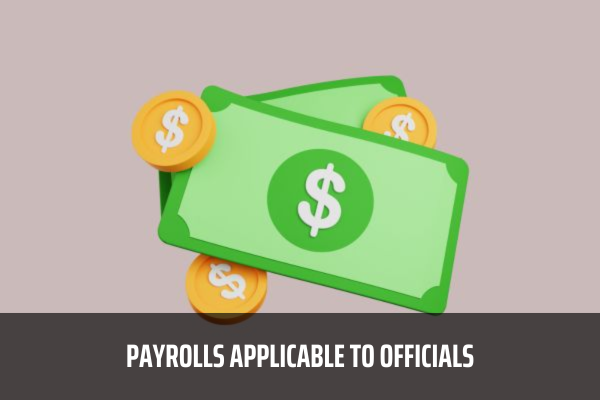Will the salary for officials increase after the salary reform in Vietnam under the Resolution 27 from 2025 onwards?
Will the salary for officials increase after the salary reform in Vietnam under the Resolution 27 from 2025 onwards?
Starting from July 1, 2024, comprehensive salary policy reforms will be implemented according to Resolution 27-NQ/TW in 2018.
Pursuant to Resolution 27-NQ/TW in 2018, new payrolls will be formulated as follows:
- The current statutory pay rate and salary coefficient will be annulled, and a specific base pay will be established in the new payrolls.
- The minimum salary level for officials and public employees in the public sector will be determined based on the salary of those with intermediate-level training (Level 1), which should not be lower than the minimum salary for trained workers in the private sector.
- The salary system will gradually approach the salary structure of the private sector, taking into account the state's resources.
- The system for regular salary increases and promotions ahead of schedule for officials, public employees, and armed forces will be improved according to the new payrolls.
According to the Government's official portal, the Minister of Home Affairs stated that under the salary reform plan, it is expected that the average salary for officials and public employees, including base pay and allowances, will increase by about 30% from July 1 onwards.
From 2025, this salary level will continue to be adjusted annually, with an average increase of about 7% per year.
Although we have not implemented the salary reform in the past three years, the statutory pay rate has been adjusted twice, resulting in a 29.5% increase. Therefore, if we calculate the total increase from 2021 (the expected implementation of the salary reform according to Resolution 27-NQ/TW in 2018) to July 1, the salary for officials and public employees has already increased significantly, by about 60% on average. Although this number is not a significant leap, it is still a considerable increase compared to the annual average increase of 7% without the salary reform.
Therefore, when implementing the salary reform in 2024, the income of officials from salaries will continue to be adjusted with an average annual increase of about 7% from 2025 onwards

Will the salary for officials increase after the salary reform in Vietnam under the Resolution 27 from 2025 onwards?
Vietnam: What are 02 payrolls applicable to officials holding leadership and non-leadership positions from May 2024?
On January 5, 2024, the Government issued Resolution 01/NQ-CP in 2024 on the tasks and main solutions for implementing the economic-social development plan and state budget estimate for 2024. This resolution includes provisions on implementing the salary reform policy.
Pursuant to Appendix IV issued with Resolution 01/NQ-CP in 2024, the Government assigned the Ministry of Home Affairs to lead the implementation and complete the new salary regime for officials, public employees, and armed forces in May 2024.
Resolution 01/NQ-CP in 2024 also specifies the timeline for implementing the salary reform according to Resolution 27-NQ/TW in 2018 of the Central Executive Committee on salary policy reform for officials, public employees, armed forces, and employees in enterprises.
Therefore, the 02 official payrolls for leadership and non-leadership positions under the new salary regime for officials, public employees, and armed forces from May 2024, following the salary reform policy, are as follows:
Payroll 1:
Payroll for officials and public employees holding leadership positions (elected and appointed) within the political system from the central to commune level, based on the following principles:
- The salary level must reflect the hierarchy within the political system; those holding leadership positions will receive salaries based on their positions. If a person holds multiple positions, they will receive the highest salary level among those positions. If the leadership positions are equivalent, they will receive the same salary level. The salary level of higher-level leaders must be higher than that of lower-level leaders.
- A salary level will be specified for each type of equivalent position; there will be no classification by ministries, sectors, departments, committees, or equivalent at the central level when constructing the payroll for central-level positions. There will be no differentiation in salary levels for the same leadership positions based on the classification of local administrative units, which will be implemented through allowances.
- The classification of equivalent leadership positions within the political system for designing the payroll will be decided by the Politburo after reporting to the Central Executive Committee.
Payroll 2:
Professional and technical payrolls based on officials' ranks and public employees' professional titles, applied to officials and public employees who do not hold leadership positions. Each officials' rank and public employees' professional title will have multiple salary levels based on the following principles:
- For the same level of job complexity, the salary levels will be the same. Conditions for higher-than-normal work and occupational incentives will be implemented through occupational allowances. The grouping of salary grades and levels within officials' ranks and public employees' professional titles will be rearranged, encouraging officials and public employees to improve their professional and technical qualifications.
- Appointments to officials' ranks or public employees' professional titles must be associated with job positions and the structure of officials' ranks and public employees' professional titles will be implemented by the management agency responsible for officials and public employees.
Note: The 02 payrolls above are formulated in accordance with the spirit of Resolution 01/NQ-CP in 2024, which implements the salary reform according to Resolution 27-NQ/TW in 2018. However, the specific details, implementation process, and official application of the 02 payrolls will need to wait for further instructions from the Government.
Vietnam: What are the officials?
Pursuant to the provisions of Article 4 of the Law on Officials in 2008 amended by Clause 1, Article 1 of the Law on amendments to the Law on Officials and the Law on Public Employees in 2019:
Officials are Vietnamese citizens who are recruited and appointed to ranks, posts or titles in agencies of the Communist Party of Vietnam, the State, socio-political organizations at the central, provincial and district levels; in People’s Army agencies and units, other than officers, professional military personnel and defense workers; in People’s Police offices and units other than officers and professional non-commissioned officers, included in the payrolls and salaried from the state budget.
LawNet
